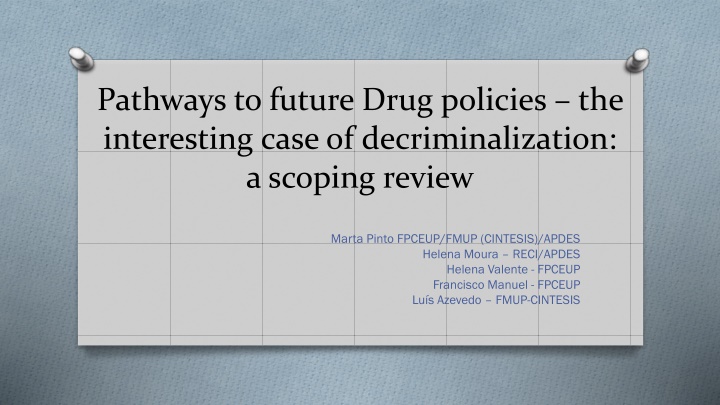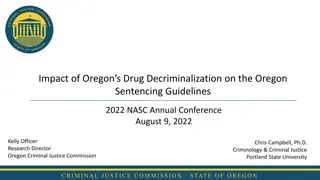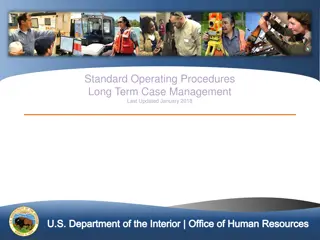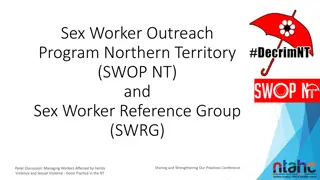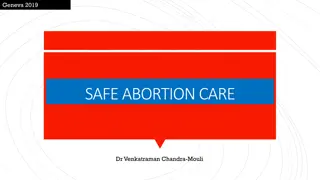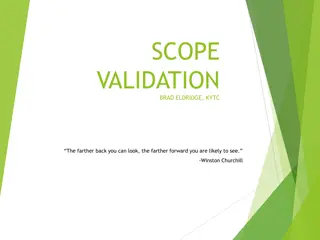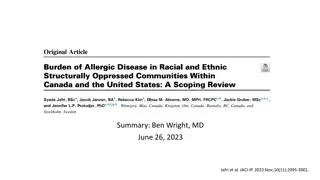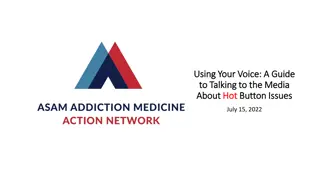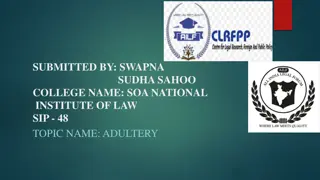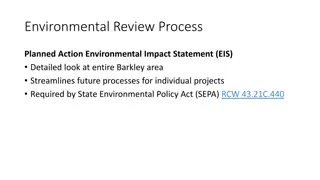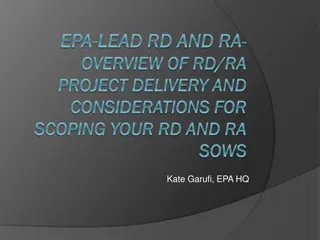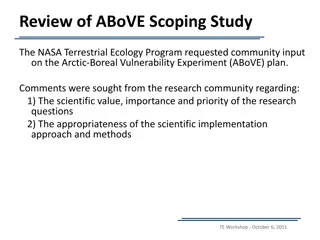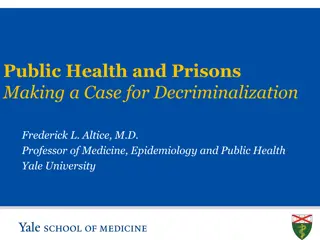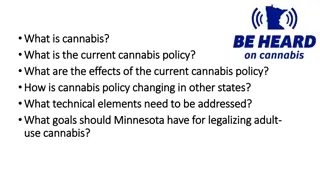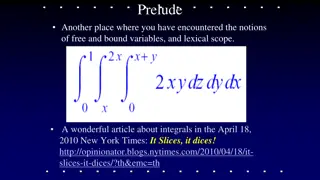The Case of Decriminalization: A Scoping Review
This scoping review explores the effects of punitive drug policies, highlighting issues such as right to privacy, human rights abuses, and public health crises. It discusses how current approaches contribute to community health and safety worsenings, emphasizing the need for policy reform towards decriminalization to address drug-related harms effectively.
Download Presentation

Please find below an Image/Link to download the presentation.
The content on the website is provided AS IS for your information and personal use only. It may not be sold, licensed, or shared on other websites without obtaining consent from the author.If you encounter any issues during the download, it is possible that the publisher has removed the file from their server.
You are allowed to download the files provided on this website for personal or commercial use, subject to the condition that they are used lawfully. All files are the property of their respective owners.
The content on the website is provided AS IS for your information and personal use only. It may not be sold, licensed, or shared on other websites without obtaining consent from the author.
E N D
Presentation Transcript
Pathways to future Drug policies the interesting case of decriminalization: a scoping review Marta Pinto FPCEUP/FMUP (CINTESIS)/APDES Helena Moura RECI/APDES Helena Valente - FPCEUP Francisco Manuel - FPCEUP Lu s Azevedo FMUP-CINTESIS
Harmful Drug Policies (GCDP, 2016) PUNITIVE APPROACHES TO DRUGS: A FAILURE BY THEIR OWN MEASURE O UNDERMINING THE RIGHT TO PRIVACY O UNDERMINING THE RULE OF LAW O HUMAN RIGHTS ABUSES COMMITTED UNDER THE INTERNATIONAL DRUG CONTROL REGIME O PUBLIC HEALTH CRISES O PRISON OVERCROWDING O DRUG LAWS AS A TOOL OF SOCIAL CONTROL O THE HARMS OF RECEIVING A CRIMINAL RECORD
Colateral damage of the war on drugs O The global war on drugs is driving the HIV/AIDS pandemic among people who use drugs, although research has shown that repressive law enforcement forces users away from public health services and into hidden environments where HIV risk becomes markedly elevated. An assessment of the impacts concluded that many nations and international organizations tasked with reducing the drug problem have actually contributed to a worsening of community health and safety (GCDP, 2012)
UN estimate about the annual drug consumption from 1998 to 2008 (GCDP, 2011) Opiates Opiates Cocaine Cocaine Cannabis Cannabis 1998 1998 12.9 millions 13.4 millions 147.4 millions 2008 2008 17.35 millions 17 millions 160 millions % % of of growth growth 34.5% 27% 8.5%
Colateral damage of the war on drugs (Transform, 2016) O Estimated $100 billion being pumped annually into law enforcement-led around the world to combat drugs, with the results mainly involving the criminalization and incarceration of low-level, nonviolent drug offenders. Estimated 83% of all drug- related offences worldwide are simple possession offences. O The number of adults globally who have used drugs increased almost 20 per cent between 2006 and 2013 from 206 million to 246 million. Rather, they help swell prison populations, stoke the spread of blood-borne viruses and other infectious diseases and contribute to the level of drug-related deaths, which in 2013 stood at close to 200,000 globally.
The potential of decriminalization (Transform, 2016) O While the precise number of countries with formal decriminalization policies is not clear, it is likely slightly above 30 depending on which definitions are used. (Here`s one of the reasons for performing a scoping review)
The potential of decriminalization (Transform, 2016) O When implemented effectively appears to direct more people who use drugs problematically into treatment, reduce criminal justice costs, improve public health outcomes, and shield many drug users from the impact of a criminal conviction. O When coupled with investment in harm reduction, and health and social services, can have an extremely positive effect on both individuals who use drugs and society as a whole.
TENDENCY SINCE 2001 DECRIMINALIZATION IN PORTUGAL (GOUL O, 2017) Small raise on the use of PS among adults; Reduction of the use of illicit substances among adolescents; Reduction of the prevalence of injected use; Reduction of the incidence of blood born infeccions; Reduction of the stigma connected to PUD; Reduction of the weight of PUD in the judicial system; Raise of the amount of drugs kept by police forces; More effective actions taken by police and customs. 20 20 20
Portuguese decriminalization Hughes & Stevens, 2012 O Decrease in current and recent drug use, especially between those aged 15-24, the most at risk of initiation and long- term engagement; O Considerable expansion of access to drug treatment; O Partial evidence that the reform may have contributed to diminish drug-related deaths;
Portuguese decriminalization Gon alves, Louren o and Nogueira da Silva, 2015 O A reduction of approximately 12% (on average) in the social cost of drugs in the 5- year period that followed the NSFAD s approval, in 1999, and a rather significant 18% (average) reduction until 2010 O This social cost reduction is rooted only partly on the observed reduction of the (direct and indirect) legal system costs associated with (the fewer) individuals imprisoned for drug-law offences, especially after the decriminalization of drug use O Another main explanatory factor for the reduction in social costs was the rather significant reduction of indirect health costs, namely the reduction of drug-related deaths. Although there has been an increase in (direct) health-related costs for drug addiction, this increase was small compared to the rather significant reduction in the remaining health-related cost categories we look at.
Pathways to future Drug policies the interesting case of decriminalization: A scoping review
AIM O To scientifically inform a possible drug policy reform
Objectives To map: O Types of existing decriminalization policies O Types of existing studies O Research gaps
Methods and analysis O Arksey and O`Malley and the Joanna Briggs Scoping Review as well as Levac et al methodological enhancement will be used: (1) identifying the research question; (2) identifying relevant studies; (3) selecting studies; (4) charting the data; (5) collating, summarizing and reporting the results and (6) consulting relevant stakeholders.
Methods and analysis Main research question (acronym used PCC): What What drug use drug use decriminalization decriminalization policies, implemented in any part of policies, implemented in any part of the world, are documented in peer reviewed and grey literature? the world, are documented in peer reviewed and grey literature? Population Illicit psychoactive substances Context Any territory with decriminalization practices Concept - Decriminalization policies (even if only in de facto terms)
Secondary research questions O What types of primary studies exist on this domain? O What definitions have been used to describe decriminalization experiences? O What research gaps exist?
Inclusion criteria O All studies focused on decriminalization experiences all over the world published since 1970 with no language restrictions. O Qualitative, quantitative and mixed-methods research will be taken into consideration as well as Policy documents, expert opinion pieces and other relevant grey literature elements. O Exclusion criteria - ???
Search strategy (three stage design) stage one: search in MEDLINE and in Criminal Justice Abstracts Full Text followed by an analysis of the words in the title and of the index terms used to describe the article; O stage 2: identification and analysis of all keywords and index terms found in the pertinent papers will help to refine the search, as well as the input from the research team, research collaborators. O stage 3: Databases to consult will be MEDLINE with Full Text, CINAHL; EMBASE; Cochrane library; Campbell library; Joanna Briggs Institute Library; PsycARTICLES; PsycINFO; Psycextra; Social Work Abstracts and Social Services Abstracts; ProQuest; Scopus. Google Scholar; Google; American Doctoral Dissertations; BAES; b-on; Open Grey; ProQuest Dissertations and Thesis, Grey Literature Report, Web of Science Conference Proceedings, contacting authors, experts and organizations active within the phenomenon of interest will be used to identify unpublished and ongoing studies. A targeted search of the grey literature in local, provincial, national and international organisations` websites and related health or scientific organizations including UNAIDS, IDPC, GCDP; OSF will also be conducted. O
O Endnote will be used to manage and eliminate duplication of studies. No individual quality assessment of studies will be made, since this is a scoping review.
Study selection (two levels of screening) O 1. Title and abstract review - two researchers will independently screen the title and abstract of all retrieved papers for inclusion. O 2. Full-text review - any articles deemed relevant by either or both of the reviewers will be included and two independent reviwers will assess the full-text articles confronting them with the inclusion/exclusion criteria. Inter-rater agreement will be determined by Cohen's statistic. Discrepancies will be discussed and solved by consensus or by the contribution of a third researcher.
Data extraction O To extract data, a tool will be created and synthesis will be based on the Arksey and O`Malley and the Joanna Briggs Scoping Review methodologies. O Study characteristics to be extracted will include, but not be limited to: publication year, type of document (ex. Policy, scientific), study design, country, decriminalization model`s characteristics, advantages and disadvantages attributed to the experience. This tool will be pretested by all reviewers before implementation. Data extraction will be performed by two independent reviewers.
Data summary and synthesis of the results O A synthesis map of decriminalization policies in the world the of the type of studies approaching them will be the main product.
Consultive commission O A consultive commission will be created, composed by experts but also decision makers and activists. The final map will be discussed in a focus-group to help to understand pathways for the future research and policy making.
Bibliography Eastwood, N.; Fox, E.; Rosmarin, A. (2016). A quite revolution: drug decriminalisaion across the globe. https://www.release.org.uk/sites/default/files/pdf/publications/A%20Quiet%20Revolution%20- %20Decriminalisation%20Across%20the%20Globe.pdf Global Comission on Drug Policy (2012). The war on drugs and HIV/AIDS: how the criminalisation of drug use fuels the global pandemic. https://www.globalcommissionondrugs.org/reports/the-war-on-drugs-and-hivaids/ Global Comission on Drug Policy (2013). The negative impact of the war on drugs on public health: the hidden hepatitis C epidemic. https://www.globalcommissionondrugs.org/wp-content/uploads/2016/03/GCDP_HepatitisC_2013_EN.pdf Global Comission on Drug Policy (2014). Taking control: pathways to drug policies that work. https://www.globalcommissionondrugs.org/reports/taking-control-pathways-to-drug-policies-that-work/ Global Comission on Drug Policy (2015). The negative impact of drug control on public health: the global crisis of avoidable pain. http://www.globalcommissionondrugs.org/wp-content/uploads/2012/03/GCODP-THE-NEGATIVE-IMPACT-OF-DRUG-CONTROL-ON- PUBLIC-HEALTH-EN.pdf Global Comission on Drug Policy (2016). Advancing Drug Policy Reform: a new approach to decriminalization. http://www.globalcommissionondrugs.org/wp-content/uploads/2016/11/GCDP-Report-2016_POR.pdf MacCoun, R. and Reuter, P. (2001). Drug War Heresies. Cambridge University Press. http://assets.cambridge.org/97805215/72637/frontmatter/9780521572637_frontmatter.pdf Ritter, A. (2010). Illicit drugs policy through the lens of regulation. International Journal of Drug Policy. Jul;21(4):265-70. doi: 10.1016/j.drugpo.2009.11.002. Transform Drug Policy Foundation (2009). After the war on drugs: blueprint for regulation. http://www.tdpf.org.uk/sites/default/files/Blueprint.pdf O O O O O O O O O
Thank you! O martadesousapinto@gmail.com
